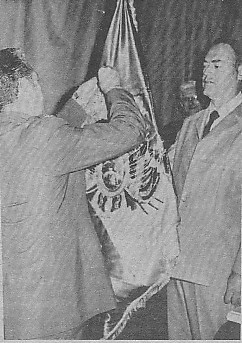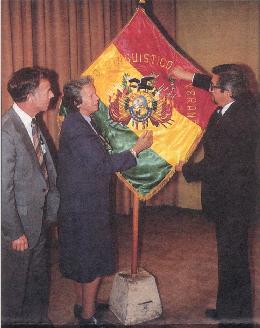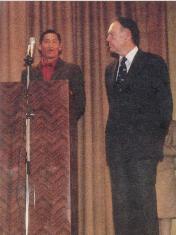 |
Distinctions
Orden de la Educación Boliviana
Condor of the Andes
Orden de la Educación Boliviana
To celebrate the twenty-fifth anniversary of our mission in Bolivia, in November 1980 we had an exposition and special program in La Paz. With national officials and many people from the ministry of education present, we had opportunity to tell about our work, our spiritual motivation, and our aspirations for the small tribes, the forgotten peoples, of Bolivia. At this program, the Minister of education, Coronel Ariel Coca Aguirre, conferred on us the “Gran Orden Boliviano de la Educación,” in gratitude for our work with the tribes’ people. The Presidential resolution authorizing the award said in part:
“The ILV has spent 25 years of uninterrupted, intense, and purifying work in behalf of the jungle people of Bolivia, successfully elevating their world view, their way of thinking and their mode of expression, thus enabling them to be incorporated into the national life; and has trained and prepared several dozen bilingual teachers, health promoters, and middle-level technicians. Taking special notice of the fruitful work of the Instituto Lingüístico de Verano in the far regions of the country, the Ministry of Education, in this solemn and worthy act, bestows upon the Instituto Lingüístico de Verano the national honor ‘La GRAN ORDEN BOLIVIANA DE LA EDUCATION.’” The resolution was signed by General Luis Garcia Meza Tejada, President of Bolivia, and other leaders.
Back to Top
Reconocimiento a la labor del Instituto Lingüístico de Verano
Ultima Hora, jueves 13 de noviembre de 1980
En ceremonia especial realizada ayer en la Casa de la Cultura “Franz Tamayo”, el Ministerio de Educación reconoció la labor de 25 años del Instituto Lingüístico de Verano, con la orden de la Educación Boliviana, impuesta por el ministro Ariel Coca. En el acto estuvo también presente el Gral. Waldo Bernal, comandante de la Fuerza Aérea y ministro del Aire, autoridades nacionales y numeroso público.
El Instituto Lingüístico de Verano trabaja en nuestro país desde 1954, en virtud de convenios firmados con los ministerios de Salud, Educación y Asuntos Campesinos.
Pocos conocen la importante labor que cumple este grupo conformado por ciudadanos alemanes, americanos, austriacos y de varias ciudades europeas, que trabajan en forma silenciosa pero eficaz en los más apartados rincones del territorio. Regiones olvidadas y desconocidas para los propios bolivianos. Por ello, se ha hecho justicia con la distinción que es un pequeño renocimiento del gobierno boliviano.
El Instituto Lingüístico es una organización de caracter científico, espiritual y social, con gran interés en la alfabetización de los pueblos autóctonos para prepararlos a ser incorporados como ciudadanos útiles al desarrollo del país. Ante todo, explica un directivo de esta entidad “tenemos presente a la persona humana, creada igual a nosotros ante los ojos de Dios, a partir de esa premisa trabajamos para él y con él, en su vida espiritual y su desarrollo intelectual y corporal”, para ellos los lingüístas aprenden primero el dialecto del grupo de indígenas donde les toca vivir, y luego crean la cartilla en el dialecto para enseñarles a leer y escribír en su propia lengua, “porque educadores y psicólogos concuerdan en que un niño debe aprender a leer y escribir en la lengua que se hable en el hogar y en la cual tiene lugar sus primeras comunicaciones verbales, con padres y familiares”.
|

Momento en que el ministro de Educación, Cnl. Ariel Coca, impone al estandarte del Instituto Lingüístico de Verano, la “Orden de la Educación Boliviana”. |

La testera del acto en el que se condecoró al Instituto Lingüístico de Verano. |
Han llevado también conocimientos de su historia, y costumbres a esos pueblos traducidas en su lengua, también la Biblia han traducido los lingüístas a varias de estas lenguas indígenas, como el Sirionó, Chipaya. Lo mismo que cuentos y leyendas de fácil acceso para ellos, textos de folklore, folletos sanitarios y muchos manuales didácticos.
|
Back to Top
Condor of the Andes
September 4, 1985 was the day planned for the “Farewell Program.” Then began the unsettled political situation with demonstrations, strikes and marches. It was doubtful if we could even go ahead with the program.
The Minister of Education declared that HE wanted to sponsor the program in honor of ILV and that it would be held regardless of the political atmosphere. The minister himself, Dr. Enrique Ipiña M., began by reading a presidential decree conferring upon SIL of Bolivia the medal “Condor of the Andes,” the highest distinction possible for a non-government organization such as ours. He spoke for almost a half hour, expressing his own appreciation and that of his government for the SIL work in Bolivia. “What other organization, Bolivian or foreign, has done so much for the ethnic minorities?” “Your work in Bolivia is like the seed which feel on good soil; it continues to bear fruit not only here but also in other countries of the world.” Perry Priest had the privilege of responding, expressing our appreciation for being allowed to work in this wonderful land for the past thirty years, and sharing a bit of what our purpose has been in being here. Vicente Ino, a Sirionó man, then spoke in his own language (with Perry Priest translating), expressing the satisfaction of people from various tribes that SIL had come to teach them and to give them God’s Word.
Back to Top
Thirty Years in Bolivia: A Tribute
by John Lindskoog
From “In Other Words,” October/November 1985
In a public ceremony on September 4, 1985, in La Paz, the Bolivian Ministry of Education officially marked the completion of 30 years of work by the Summer Institute of Linguistics (SIL). In his speech the minister of education acknowledged the cooperative efforts that have resulted in a mass of research and educational literature on Bolivian Indian languages and culture. With deep feeling he hailed the positive moral and spiritual impact that has resulted from the personal lives and Bible translation work of members of SIL.
Field director Perry Priest and his team had been planning the closing ceremonies for months. They chose September 4 for the big day. Even 48 hours before that day a continuing nationwide strike made it doubtful the ceremonies could take place. But hundreds of people were praying and things began to change drastically.
The day before the program, SIL members Perry Priest, Dave Farah, John Alsop, Ken Gregerson, Elaine Townsend and Vicente Ino, a Sirionó Indian, had an excellent interview with the minister of education who warmly commended SIL for its work in Bolivia.
Only hours before the ceremony, and despite the nationwide strike, the president of Bolivia, Dr. Victor Paz Estenssoro, granted a special audience to members of SIL. Elaine Townsend, wife of the late founder of SIL and WBT carried personal greetings from mutual friends in Peru. Ken Gregerson, president of SIL, thanked the president and his nation for the privilege of 30 years of partnership. David Farah, Bolivia branch member and international director for government relations, presented sample copies of SIL publications to the president. He recalled that the president himself, during an earlier term of office, had signed the initial invitation for SIL to work in Bolivia.
The president accepted the books from Dave Farah as a final report to the people of his nation. The meeting ended with Dave Farah leading in prayer for the president and people of Bolivia.
On September 4, the closing ceremony took place at the Casa de la Cultura Boliviana (Museum of Bolivian Culture), hosted by the Bolivian minister of education, Dr. Enrique Ipiña Melgar. About 150 people were present. Central to the program was the conferring on SIL of a decoration, the Condor of the Andes, the highest honor given to non-Bolivians.
The minister of education was lavish in his praise of SIL. He spoke of the organization’s work as a grain of wheat which will produce much in his country. He asked “What other organization, Bolivian or foreign, has done so much for the ethnic minorities?” He mentioned the “shadows and doubts” which have been cast on SIL by critics, but he said, “These should be tossed aside--every good work will be criticized by someone.”
The act of conferring the decoration was deeply moving. As Elaine Townsend and Ken Gregerson stood in attendance, the minister pinned the medal, the Condor of the Andes, onto a beautiful Bolivian flag with the Spanish name of SIL on it. Perry Priest, Bolivia SIL director, responded with obvious sincerity and emotion. With regard to SIL’s dedication to spiritual values he said, “Any scientific work that ignores spiritual need is cruel.” Perry also emphasized that SIL’s purpose is to provide tools which will enable the indigenous groups to cope with their changing environment. SIL has done this in Bolivia. The ethnic minority groups have functional alphabets, literacy materials, specific community development programs and they have at least some of the Bible. These tools will remain in Bolivia when SIL leaves. The people can use them as needed and still maintain their cultural identity and cultural values. Perry ended his address with thanks to God and the Bolivian people for the opportunity to serve in Bolivia and complete the projects. |

Minister of Education Dr. Enrique Ipiña Melgar pins the Condor of the Andes on the Bolivian flag as Ken Gregerson and Elaine Townsend look on. |
Back to Top

Vicente Ino gives his speech in Sirionó as Perry Priest interprets. |
Vicente Ino, a Sirionó Indian from the people whom Perry and Anne Priest had served, spoke for the ethnic minority groups. He thanked the government, the president, and SIL. Through the help SIL has given, he said, he and his people have learned that they are neighbors with all other Bolivians. “We are one,” he said. He then gave the minister of education a big abrazo and evryone applauded. Ken Gregerson spoke briefly, thanking the Bolivian government for 30 years of partnership and cooperation. He said, “Let’s not say adios (a definite final goodbye) but hasta luego (until we meet again).” Elaine Townsend added her expression of thanks to Bolivia but she was so overcome by emotion she asked Dave Farah to finish reading her speech.
Following these spoken tributes, a group of local musicians played several compositions in indigenous style. The music was lovely, with panpipes, flutes, drums and strings. Then the guests went upstairs to the reception hall and enjoyed a variety of local Bolivian hors d’oeuvres. Dozens of Bolivian friends expressed appreciation for SIL.
|
The ceremony probably would not have been possible twenty-four hours later. The next day political protest marches clogged the streets as the nationwide general strike continued.
Most of the SIL teams have already left Bolivia, but a few will stay on until the end of 1985, and at least two for several months in 1986. The Ministry of Education is interested in a continuing relationship in which SIL advisors would come regularly to counsel in coming years.
After the ceremony, SIL president Ken Gregerson remarked, “I would like to pay tribute to my colleagues of the Bolivia branch under the leadership of director Perry Priest. Their vision and dedication have brought us to today. Their thirty years of teamwork and camaraderie are an inspiration to me. Their ‘can and will do’ spirit is obvious.
“I must pay tribute also to the deep bond of love between Bolivians and Institute members which I found everywhere. Vicente Ino, Perry Priest’s Sirionó friend, embodied this friendship as he travelled with us to the capital city to personally thank the minister of education for SIL’s educational and Bible translation work in his community.
“And finally, it is God who has enabled our colleagues in Bolivia to finish their task and, as our founder Uncle Cam has urged us, move on to pioneer again.”
|